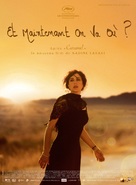Reviews provided by RottenTomatoes
Mary F. Pols, TIME Magazine: Director and co-writer Nadine Labaki has a careful, delicate hand when it comes to balancing the precious and the poignant. Read more
Stephen Holden, New York Times: The continually shifting tone of the movie, whose director also did the romantic comedy "Caramel," keeps you giddily off balance. Read more
Joe Morgenstern, Wall Street Journal: "Where Do We Go Now?" suffers from a serious clash of styles, but it's also brave and startlingly funny... Read more
Moira MacDonald, Seattle Times: This spirited troupe of women ... makes us citizens of the village, invested in their joys and fears. We grieve with them, under that burning sun, and hope with them for a lasting peace. Read more
Tasha Robinson, AV Club: To Labaki's credit, she manages to take the film between tonal extremes credibly and without dulling the impact of either the humor or the horror. Read more
Barbara VanDenburgh, Arizona Republic: It is, at times, a charming reprieve from the usually dour cinematic explorations of Middle Eastern conflicts. Read more
Ty Burr, Boston Globe: Labaki is a forceful director and a stunning screen presence, but "Where Do We Go Now?" suffers from diffuseness. Read more
Mark Olsen, Chicago Tribune: Read more
Tom Long, Detroit News: "Where Do We Go Now?" is more interesting than satisfying. Read more
Owen Gleiberman, Entertainment Weekly: It shows no curiosity about the hatred, so the characters seem less than whole. Read more
Mark Olsen, Los Angeles Times: In the end, "Where Do We Go Now?" has little to say about human conflict beyond the obvious. Read more
John Anderson, Newsday: Labaki never claimed to be Noel Coward, but the facile comedy leads to a dilution of the message she strives so strenuously to make. Read more
Stephen Whitty, Newark Star-Ledger: Making a movie about sectarian violence in which the local religious figures are comically powerless, at worst, seems like too easy a path to take. Nothing springs from nothing. Read more
Mark Jenkins, NPR: It's the sort of well-meaning fable that's ultimately more admirable than persuasive. Read more
Farran Smith Nehme, New York Post: The lack of flow and coherence in "Where Do We Go Now?'' leaves not only the characters, but also the audience, wondering where to go. Read more
Steven Rea, Philadelphia Inquirer: Time passes with a sense that nothing is really happening, until suddenly too much happens all at once. Read more
Roger Ebert, Chicago Sun-Times: The movie is never quite bold enough to point out the contradiction of Muslims and Christians hating one another, even though they both in theory worship the same god. Read more
Colin Covert, Minneapolis Star Tribune: It's a fresh take on Mideast strife to see the endless battles from a feisty feminist point of view, but most of the acting and plotting is subpar. Read more
Joe Williams, St. Louis Post-Dispatch: With elements of a musical, a melodrama and a multicultural romance, "Where Do We Go Now?" is as hard to define as the crossroads region where it's set. Read more
Rick Groen, Globe and Mail: Where Do We Go Now? is a tragic-comic fable that speaks to how we live now, and have lived for far too long. Read more
Alonso Duralde, TheWrap: Veering from wackiness to horror and then back again is the kind of balancing act that would challenge even the most talented filmmakers, and Labaki, for all her good intentions and daring ideas, just can't swing the shift. Read more
Trevor Johnston, Time Out: This is energetic, bursting with sincerity, yet also frustrating and disappointing. Read more
Keith Uhlich, Time Out: By the time the film takes a glib turn into role-switching farce-as Muslims become Christians and Christians become Muslims-the overall toothlessness of the satire becomes damningly apparent. Read more
Linda Barnard, Toronto Star: The meandering script occasionally has an unpolished feel, confusingly taking too long to flesh out parts of the story while making unsettling swings from comedy to tragedy and back. Read more
Alison Willmore, Village Voice: Like the hashish-laced pastries the ladies make to sedate the male population, the film feels like it has been dosed with sugar to mask its distressingly bitter taste. Read more
John DeFore, Washington Post: A satire in which pathos competes with light comedy and neither quite flourishes. Read more

